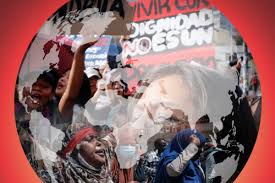The rights of workers around the world are facing serious threats, with labour protections rapidly disappearing due to rising authoritarianism, ongoing conflicts, and unchecked corporate influence. This is the main conclusion of the 2025 Global Rights Index released by the International Trade Union Confederation (ITUC). The report was made public during the opening of the International Labour Conference taking place in Geneva, Switzerland.
According to the ITUC, the current state of workers’ rights is worse than ever before. The organisation warned that only seven countries in the world still fully respect the rights of workers as defined by international labour standards, while 39 countries have now fallen into the worst category of the index. This marks a sharp decline from 2014, when the Index was first introduced.
Countries like Afghanistan, Libya, Myanmar, Somalia, and Yemen were among 12 countries given the lowest possible rating of 5+. This classification points to a complete collapse of the rule of law, where workers face violence, lack of security, and no legal protections. The ITUC explained that in such places, union leaders and workers are not only unable to negotiate for their rights, but also live in fear for their lives.
Luc Triangle, General Secretary of the ITUC, said the situation was dire. He described the current trend as a betrayal of the post-World War II global commitment to democracy, justice, and trade union rights. “Workers are under siege around the world,” Triangle stated, adding that the increasing attacks on workers’ rights should be a wake-up call for governments, employers, and international institutions.
The ITUC report shows that 75 per cent of countries are now denying workers the basic right to join or form trade unions. In 74 per cent of countries, governments or employers are actively blocking the registration of unions. Other serious violations reported include restrictions on free speech and public assembly in 45 per cent of countries, arrests and detentions of union leaders in 71 countries, and violence against workers in 40 nations.
The Global Rights Index uses 97 indicators based on International Labour Organisation (ILO) standards to evaluate the labour conditions in 151 countries. The 2025 edition of the index has revealed widespread regression across most regions, especially Europe and the Americas, which recorded their worst performances since the index began.
Although most countries recorded little or no improvement, Australia’s rating improved to level 2, indicating relatively strong respect for workers’ rights. Mexico and Oman also moved up to level 3. On the other hand, seven countries, including Italy, Argentina, Costa Rica, Panama, Georgia, Niger, and Mauritania, dropped to lower categories due to new violations.
The report also highlighted how civil liberties are shrinking, with union activities being criminalised in some countries. Governments are also showing increasing intolerance towards workers who speak out, while companies are gaining more influence over labour laws and employment conditions.
At the International Labour Conference, the ITUC is calling for urgent reforms. The group is pushing for the formalisation of informal jobs, better labour protections in the gig economy, stronger global health and safety standards, and the enforcement of existing labour rights through international cooperation.
Triangle said the global labour movement is determined to fight back against the attacks on workers. “We must rebuild economies that serve people, not corporations,” he said. “We need strong, independent unions and international bodies that will defend the people they were created to protect.”
He added that if no action is taken, the number of countries where workers enjoy full rights will drop to zero within the next ten years. Triangle concluded that next year’s index should show signs of real progress, stressing that now is the time to act.
The 2025 Global Rights Index is expected to guide debates and decisions at the International Labour Conference, especially in the Committee on the Application of Standards, where countries are held accountable for upholding international labour laws.
